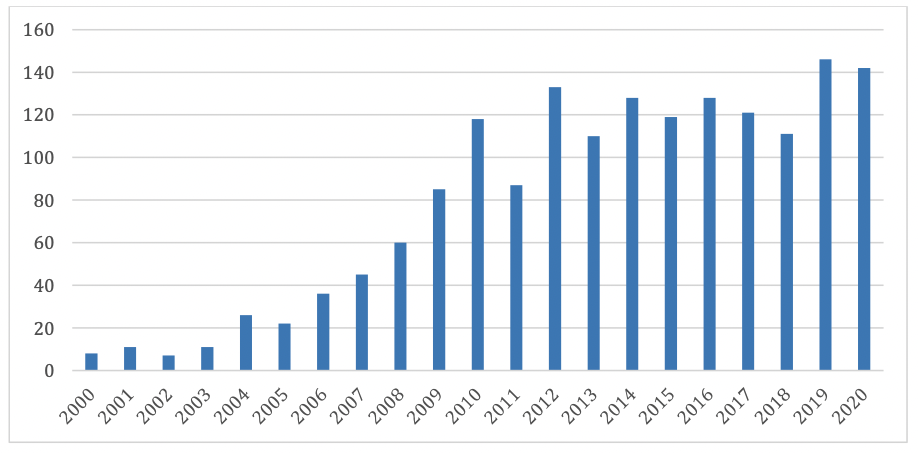This month’s WHiP: The Philosophers focuses on a chapter from The Compact Compendium of Experimental Philosophy edited by A. Bauer and S. Kornmesser (forthcoming). All in the Family: The History and Philosophy of Experimental Philosophy by Justin Sytsma, Joseph Ulatowski, and Chad Gonnerman digs into the history of various philosophers who have argued for the need to go beyond the tradition methods of the ‘armchair’ philosopher and include empirical research into the mix.
In their view, experimental philosophy (x-phi) “is philosophy with a little something extra” (2022, p. 1). The sorts of philosophical inquiries at the heart of x-phi are in no way unique. The practice of putting forward compelling arguments and reasons to believe key premises within those arguments is familiar. X-phi may even make appeals to empirical evidence in support of core arguments—still nothing too far removed from the everyday ‘traditional’ philosophical approach. According to Sytsma et al., “the twist—the something extra—is that experimental philosophers do not merely call on the empirical work of others, mining the scientific literature for their evidence, but report the results of their own studies. That is, experimental philosophers do empirical science as part of doing philosophy” Sytsma et al., 2022, p. 1).
The authors engage in a bit of experimental metaphilosophy and cite a pair of research studies which give us reason to believe that x-phi is becoming more common as a philosophical method in recent years. One cited study analyzes philosophical publications which are reliant on systematic empirical research between 1960 to 1999 and compares the data to findings between 2009 and 2013 (Knobe, 2015). Knobe’s study “suggests that, in a span of around 50 years, there has been a substantial drop—from 62.4% to a mere 11.5%—in philosophical publications on the mind that rely on purely armchair methods” (Knobe, 2015; Sytsma et al., 2022, p. 30).
Ashton and Mizrahi (2018) put data mining tools to work in an analysis of deductive indicators (e.g., ‘therefore necessarily’) vs. inductive indicators (e.g., ‘therefore probably’) across a wide range of articles in the JSTOR database. In alignment with what Knobe’s research indicates, “the difference in ratios of philosophical publications advancing deductive arguments and those putting forward inductive arguments have been gradually declining over time … [and] a decrease of just this sort is to be expected if there has been an acceleration in philosophical deployments of systematic empirical inquiry” (Ashton and Mizrahi, 2018; Sytsma et al., 2022, p. 31).
Sytsma et al. join in the research bonanza themselves, analyzing the trend of all philosophical publications tagged as ‘experimental philosophy’ between 2000 and 2020.

So it seems clear from the data that x-phi is becoming more common as an approach to addressing philosophical questions. These new-fangled x-phi folks are clearly “doing something odd, unique, or completely different” in their work, right? How do I join the cool kids x-phi club? According to Sytsma et al., the x-phi experimentalists are “united by the methodological conviction that empirical claims call for empirical support and the attitude that they can do the work to provide this support when needed” (2022, p. 34). Wait a minute! This isn’t a new or radical idea at all, is it? No, not according to the authors. In fact, “empirical claims have been common across the history of Western philosophy and appeals to empirical observation to support or subvert these claims have been equally common” (Sytsma et al., 2022, p. 34.)
While we may want to define the new experimental philosophy as being jumpstarted by the ‘Rutgers Posse’ of folks like Stephen Stich, Ron Mallon, Shaun Nichols, and Jonathan Weinberg back in 2001-2003, the movement arguably started with Thales of Miletus. While not particularly skilled in data mining online databases, Thales clearly used empirical evidence to back up his philosophical claims. Kicking off their section on the methods of x-phi within Ancient Philosophy, the authors note that “Thales is reported to have asserted that lodestones have souls, distinguishing them from inanimate things. It is hard to see what would have undergirded Thales’ assertion about magnets if not experience with them. They do, after all, display something like ‘contingent interactive behavior,’ as when they attract certain other objects” (Sytsma et al., 2022, p. 8; Aristotle [1984], 1.2, 405a19–405a21; Lorenz 2009).
What about the state of Thales’ ancient science as compared to how we would tend to define empirical study today you may ask. Well, “Even adopting a suitably broad conception of armchair philosophy and suitably strict expectations about the sophistication of ancient science, however, will only push our origin story forward at most a few hundred years” (Sytsma et al., 2022, p. 10). The authors present Aristotle as a case of utilizing empirical claims of the type we’d more likely recognize as ‘modern’ in his philosophical investigations. Let’s not forget that, as Mason notes, 20% of the existing writings from Aristotle were on biology, behavior, and the classification of over 500 species (Mason 1962, p. 412– 434). It seems rather likely that a desire to do empirical science as part of the activity of philosophy would at least have been a consideration for Aristotle. Grene and Depew note that “[o]ne cannot read him for any length of time without seeing that his central philosophical concerns were closely related to his biological interests” (2004, p.1).
Once we move forward to the late 1650s, it seems that the use of empirical methods in philosophy really took off. These ‘early modern experimental philosophers’ wanted to set aside theories that utilized empirical claims but lacked sufficient empirical evidence to back up those claims. Surveying a range of early modern experimental philosophers like Leibniz, Pascal and Boyle, the authors highlight Descartes and his scientific dissection and study of the physiology of the eye. Importantly for Sytsma et al., “This was not simply an empirical aside for Descartes. Rather, the experiment played a key role in elucidating his account of vision, which was part of his philosophical treatment of perception” (2020, p. 17).
In dealing with the Late Modern period and experimental philosophy, the authors note the important intersection between psychology and philosophy. The connection to contemporary x-phi arises at this point once we narrow our focus. Experimental philosophy includes the empirical writ large (as in early modern experimental philosophy) as well as the systematic study of intuitions in relation to the proclamation of ‘armchair’ philosophical thought experiments. It seems to me (and Sytsma et al.) that our intuitions are often confused, vary across demographics, and are not stable. Just because I happen to think that the ‘answer’ to the Trolley Problem or the Experience Machine or Philosophical Zombies is X, Y or Z it doesn’t follow that we all share those same intuitions. Hence, x-phi and a more rigorous ‘psychological’ toolkit which comes in alongside the armchair.
I can recall a lecture slide from a undergrad course I took with Jonathan Weinberg with the giant heading ‘WHY PHILOSOPHY NEEDS PSYCHOLOGY’. Starting with an interesting late 19th century example of the use of psychological research methods in exploring the sources of thought, natural realism, and Hegelism in the wild, Sytsma et al. provide multiple answers to Weinberg’s big question (Fraser, 1891; Fraser, 1892; Fraser, 1893). They note a number of relatively unknown mid 20th century cases of experimental philosophy which seem to run counter to the claim that “analytic philosophy pushed empirically oriented work out of the discipline, starting around the time of Frege and Russell” (Sytsma et al., p. 27; Fain & Kaelin 1960; Næss, 1953a; Næss, 1953b). Philosophy does need psychology according to the authors, and “many philosophers who had become hypnotized by the linguistic turn ignored the experimental work of the late nineteenth and twentieth century, much to the detriment of philosophy” (Sytsma et al., p. 27).
I think Sytsma et al. sum up the current state of x-phi well with this: “Thus, we shouldn’t think of experimental philosophy in its current incarnation as an outlier, doing something odd, unique, or completely different; instead, we should think of x-phi as a living descendant that has inherited methods and approaches from the same origin as other philosophical methods and approaches” (Sytsma et al., p. 34).
References & Further Reading:
Ashton, Zoe/Mizrahi, Moti (2018): “Intuition Talk is Not Methodologically Cheap. Empirically Testing the ‘Received Wisdom’ About Armchair Philosophy”. Erkenntnis 83 (3), pp. 595–612.
Aristotle (1984): “On the Soul”. In: Barnes, Jonathan (Ed.): The Complete Works of Aristotle. Vol. 1. Princeton: Princeton University Press, pp. 641–692.
Fraser, Alexander Campbell (1891): “Visualization as a Chief Source of the Psychology of Hobbes, Locke, Berkeley, and Hume”. The American Journal of Psychology 4 (2), pp. 230–247.
Fraser, Alexander Campbell (1892): “The Psychological Foundation of Natural Realism”. The American Journal of Psychology 4 (3), pp. 429–450.
Fraser, Alexander Campbell (1893): “The Psychological Basis of Hegelism”. The American Journal of Psychology 5 (4), pp. 472–495.
Grene, Marjorie and David Depew (2004): The Philosophy of Biology. An Episodic History. Cambridge: Cambridge University Press.
Knobe, Joshua (2015): “Philosophers are Doing Something Different Now: Quantitative Data”. Cognition 135, pp. 36–38.
Lorenz, Hendrik (2009): “Ancient Theories of Soul”. In: Zalta, Edward (Ed.): The Stanford Encyclopedia of Philosophy (Summer 2009 edition), https://plato.stanford.edu/archives/sum2009/entries/ancient-soul/
Mason, Stephen (1962): A History of the Sciences. London: Collier Books.
Næss, Arne (1953a): Interpretation and Preciseness. A Contribution to the Theory of Communication. Oslo: Kommisjon Hos Jacob Dybwad.
Næss, Arne (1953b): An Empirical Study of the Expressions “True,” “Perfectly Certain,” and “Extremely Probable”. Oslo: Kommisjon Hos Jacob Dybwad.
Weinberg, Jonathan (2016): “Experimental Philosophy, Noisy Intuitions, and Messy Inferences”. In: Jennifer Nado (Ed.): Advances in Experimental Philosophy and Philosophical Methodology. London: Bloomsbury, pp. 11–34.
Weinberg, Jonathan, Shaun Nichols, and Stephen Stich (2001): “Normativity and Epistemic Intuitions”. Philosophical Topics 29 (1–2), pp. 429–460.






